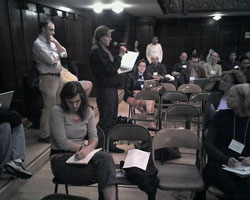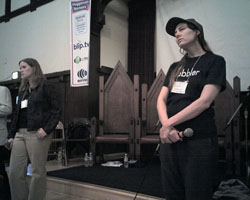http://video.lisarein.com/sfsu/..I wanted to get this up quick so it would be easy to tell people at the ACM conference.
Looks like I never told you that I HTML’d my Copyright/Creative Commons Paper and Guide.
It’s all indexed and such so it should be easier to get around in.
Don’t forget the handy pro/con table for Creative Commons Licenses
thanks!
lisa
Category Archives: Copyright Education
Jay Puts Me Up On Stage
Well I guess I was squirming in my seat a little too much. Jay Dedman finally had me come up on stage as part of the panel. Thanks Jay
If I find any pictures or footage from it, I’ll let you know.
Update: wow that took like five minutes! Here are some pictures (thanks to Steve Rhodes):
 |
 |
Final Versions Of My Final Project for SFSU
I’ve created a student licensing guide for using content in mixed media production and licensing your own production when you’re done.
The final guide is available
Here. (.doc) file
Text version.
A longer winded version of the same information contained in the Guide (with historical references)
is available here:
Word File
Text version.
My pros and cons table comparing Creative Commons 6 main licenses (and the Public Domain) is here:
Pros and Cons of Creative Commons Licenses
(As an idealist and a skeptic.)
Give Me Feedback On My Creative Commons Pros and Cons Table
Update April 13, 2006 – The link below goes to the final version. As I mentioned earlier, I hope that this table will continue to be a work in progress. Please let me know about your pros and cons.
Okay — I’ve got a draft up of my
Creative Commons Pros and Cons table.
As Both An Idealist and a Skeptic
I’m only covering the main 6 licenses. But I’d like to keep adding to it after this initial publication.
Please email me at lisa@lisarein.com with any comments/suggestions/criticisms.
I leave for school tomorrow to turn things in around 3pm PST, so please, if you can, send me your comments by noon, that would be great.
I very much appreciate whatever time you have to look this over.
Again, non-expert feedback is also very much appreciated! This is supposed to be a guide for students of broadcasting, not law 
thanks!
Songs From The Commons #7 – Why Grokster Shouldn’t Be Any More Responsible For When It Is Misused Than Smith And Wesson
This show just went up today:
Why Grokster Shouldn’t Be Any More Responsible For When It Is Misused Than Smith And Wesson
As always there is a vocal and music only version available…
Update 12/5/05 3:16pm – I had a link to my old show until now. so sorry about that!
Here’s the w/vocals version and the music only version.
New Songs From The Commons Up – A Better Introduction to Grokster – A Modern Day Sony Betamax Case
This show takes a shot at explaining the similarities between the landmark Universal vs. Sony (Betamax) case of 1984 and the current MGM vs. Grokster case that went in front of the Supreme Court last summer.
I only touch upon it briefly in my show. There’s a more complete explanation on the website.
Songs From The Commons #6
The point then, and now, is that, historically, in this country, we choose to criminalize the misuse of a technology, rather than criminalizing the technology itself. Guns, for example, are only made for killing. Killing and maybe target practice. It’s what they do. Depending on the circumstances surrounding when the killing takes place, such killing is legal or not. But do we hold gun manufacturers responsible for when gun technology is misused? Of course not. The concept is comical. In fact, legislation was recently passed to protect gun manufacturers from such liability. According to White House Press Secretary Scott McClellan, even President Bush “believes that the manufacturer of a legal product should not be held liable for the criminal misuse of that product by others.”
Unfortunately, when the Supreme’s had a chance to decide MGM vs. Grokster on these grounds, it chose to do something else – to avoid these issues entirely, and create a new kind of indirect infringement: active inducement. Active Inducement takes place if someone intends to make another person infringe and then takes active steps to encourage it.
The court basically said there were two types before (contributory and vicarious) and now there’s a new, third kind, called “inducement.” That’s what the court sent back to the Central District of California Court (9th Circuit) to determine if the defendants were actively inducing infringement.
So there used to be just two kinds of “indirect” infringement, vicarious and contributory.
“Vicarious” is when you’re supervising people and making money from it, like at the Flea Market, if the owners of the Flea Market knew that stolen goods were being sold there. (A CA court ruled that Napster did this.)
“Contributory” infringement is where you’re supplying the means with knowledge that it will be used illegally. Like if I rented a bunch of CD burners to a bootleger and knew what he was going to do with them. Now, after Grokster, there’s a third, where I intend to make you infringe and take active steps to encourage it. That’s the test laid out by the decision…
Note: Although there was a development last week in MGM vs. Grokster, where Grokster settled, agreed to shut down, and agreed to pay $59 million in damages, Grokster was not the only named defendant in the case. StreamCast, Sharman Networks (distributor of Kazaa), and the founders of Kazaa are still in litigation.
Free Expression Policy Project Updates Its Report On “Why Copyright Today Threatens Intellectual Freedom”
The Free Expression Policy Project has just published a fully revised and updated edition of “The Progress of Science and Useful Arts” Why Copyright Today Threatens Intellectual Freedom – a summary of the major controversies over file-sharing, fair use, the ever-receding public domain, the “Digital Millennium Copyright Act,” and more.
It’s available at:
The Progress of Science and Useful Arts
Why Copyright Today Threatens Intellectual Freedom
In all, fourteen amicus briefs on Eldred’s side were submitted, with a total of 141 signers. They included groups ranging from the National Writers Union and the College Art Association to the Association of American Physicians & Surgeons and Computer Professionals for Social Responsibility. Their aim was to bring home to the Supreme Court justices the real cultural costs of ever-longer copyright terms, and consequent freezing of the public domain.
The brief from online archiving projects, for example, described how Internet public-domain publishing has revived countless forgotten or hard-to-find works. Archiving projects now “digitize and distribute millions of out-of-copyright books, movies, and music … materials that commercial publishers, distributors, and rights-holders have effectively abandoned.” While media companies that own the copyrights “often let these films decay and books disappear, this material is invaluable to scholars researching our history, artists developing new art forms, and anyone seeking to explore our culture.”
To reclaim these works, they must be in the public domain. Finding and paying copyright owners is untenable, given the millions of documents involved. And in any case, the vast majority of works affected by the Sonny Bono law
Jonathan Zittrain On The Need For A Copyright Overhaul
The Copyright Cage
Bars can’t have TVs bigger than 55 inches. Teddy bears can’t include tape decks. Girl Scouts who sing “Puff, the Magic Dragon” owe royalties. Copyright law needs to change.
By Jonathan Zittrain for Legal Affairs.
Jonathan Zittrain is the Jack N. and Lillian R. Berkman Assistant Professor for Entrepreneurial Legal Studies at Harvard Law School and a director of its Berkman Center for Internet & Society.
YES, I HATE THE EFFECTS OF COPYRIGHT ON A DIGITAL REVOLUTION that heralds so much more than the banal ripping off of CD tracks. I hate that creativity is metered and parceled to its last ounce of profit. I hate that our technology is hobbled beyond its paper and other analog counterparts so that it permits us to view but not print, listen but not share, read once but not lend, consume but not create. But I can hate this situation without believing that the idea of copyright is fundamentally flawed. The framers’ vision of intellectual property (then known as “monopolies”) called for built-in limits to a creator’s exclusive rights. A copyright term, for example, would expire even if a work still held commercial value…
It’s time for us to wise up and to redraw copyright’s boundaries so that the law and reasonable public expectations fall into better alignment with one another…
Scholars like William Fisher of Harvard Law School have floated ideas as sensible as they are radical-not to mention offensive to almost every interest in the copyright debates, from publisher to middleman to anarchist. He suggests in an upcoming book that ISPs remit to publishers a fee loosely based on the amount of copyrighted digital content that they are roughly calculated to be carrying, at which point people can trade music to their hearts’ content.
Overhauling copyright will have costs to some. In the absence of tough copyright controls, investors may decide not to underwrite a $200 million blockbuster film because copying of the final product may unduly reduce their expected profit. But the cost of making no change at all must also be soberly assessed because the Internet offers such a staggering potential for the rapid transformation and evolution of ideas-a veritable Jazz Age of creation enabled by technology.
I pay my taxes. I have no idea how to calculate them, but I do what Turbotax tells me to. I’ll pay a copyright tax, too, and willingly support artists whose work I appreciate, because it’s the right thing to do and because it guarantees that more work will be made available to me. I’m not alone.
Californians: Learn About Copyright Straight From The Source
This just in from the Copyright Office:
“THE COPYRIGHT OFFICE COMES TO CALIFORNIA”
During the first week of March, top officials from the
Copyright Office will participate in a program in Los
Angeles and San Francisco where they will provide
an update on the latest Copyright Office law and
policy activities, including rulemakings, legislation,
and international activities. The program will also
include presentations on fair use in the twenty-first
century and copyright registration issues for
practitioners and copyright owners. Sponsored
by the Intellectual Property Law Section of the
State Bar of California and the Los Angeles
Copyright Society, the program will take place
March 3 in Santa Monica, Calif. and March 5 in
San Francisco. Participants may earn MCLE
credits. For further information, go to: